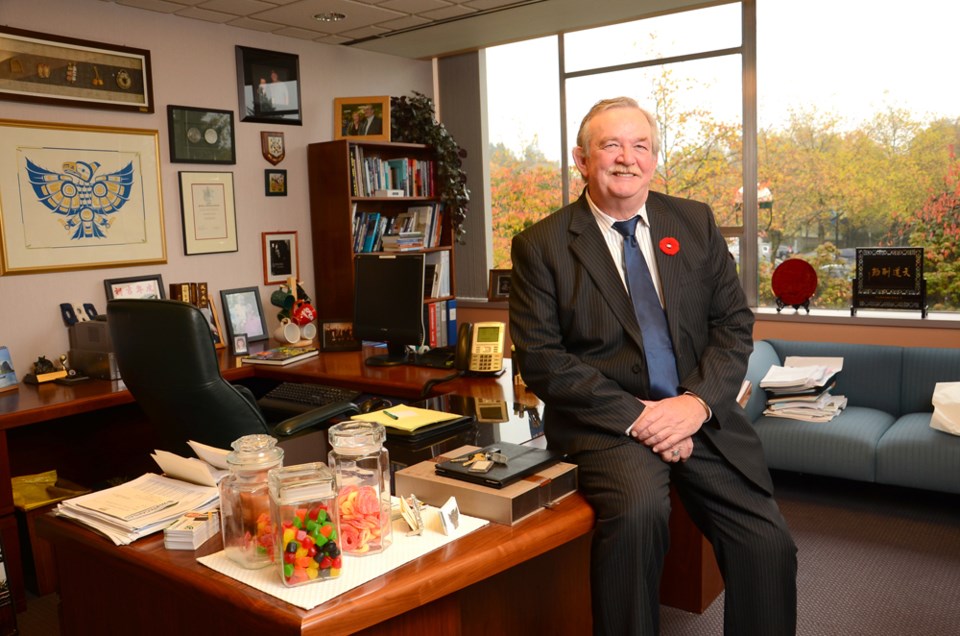Burnaby Mayor Derek Corrigan dominated headlines in 2017.
And not just in the NOW, but on the radio and in evening television newscasts.
It seemed like he was everywhere all the time. Whether it was the pipeline, the Mayors’ Council or the passing of the Metrotown downtown plan, Corrigan had something to say about it. Agree with him, or disagree with him – you can’t say you don’t know where he stands.
For that reason the Burnaby NOW has chosen him as our Newsmaker of the Year.
Corrigan’s political career started three decades ago. He was elected to Burnaby council in 1987, where he served for 15 years until 2002, when he took the job of mayor. Since 2002, the longtime politician has been re-elected five times and is gunning for a sixth term in 2018.
So what all happened in council chambers in 2017 that made the news?
In March, council approved 200 new units of affordable housing – the first units OK’d under the city’s lands program for non-market housing projects.
At the time, before the B.C. NDP came to power, Corrigan praised the program and said the City of Burnaby had done what it could by offering up the land and it was now up to the provincial and federal governments to do their part (that was a constant soundbite in his interviews).
A few months later, Corrigan and council unanimously passed the controversial Metrotown downtown plan. More than 30 housing activists shut down the July council meeting by chanting and blowing whistles. Burnaby Mounties responded to the demonstration, which came to a peaceful ending after about two hours.
Folks like Rick McGowan with the Metrotown Residents’ Association criticized Corrigan for not doing enough on the issue of affordable housing. They said the neighbourhood plan update – a mass rezoning of the area to allow for more density – would displace up to 6,000 tenants, many of whom live in low-rise walk-ups and can’t afford to live in the new, swanky towers.
The mayor called the council protest a “bullying tactic” and reiterated that affordable housing isn’t the sole responsibility of municipalities.
“We’re looking for ways to contribute, but we can’t do it all on our shoulders. We can offer up land, we can offer up bonus density (money), but we can’t expect that our property taxes are going to subsidize housing over an extended period of time,” he said. “When you’ve had 15 or 20 years of failure by the federal and provincial governments to initiate much in the way of that kind of housing and you’ve had the influx of people that we’ve had, it makes it very, very difficult to catch up.”
Corrigan used the word “bully” again in October, this time describing Ian Anderson, president of Kinder Morgan Canada, who reportedly walked into Corrigan’s office to complain about the city’s permitting process for the Trans Mountain expansion project.
Corrigan claimed Anderson was putting pressure on him. Shortly after, Kinder Morgan went to the National Energy Board to ask that it be allowed to continue work in Burnaby without city permits.
The city lost that battle when, on Dec. 7, the NEB announced the company didn’t have to comply with city bylaws.
Asked if he’d still stand in front of a bulldozer if it came down to it, Corrigan said he would. He was quick to say he doesn’t take this type of demonstration lightly and would only do it if he had “absolutely no other choice” and if all political and legal options had been exhausted.
In December, Corrigan surprised some people when he was elected chair of the Mayors’ Council.
The Mayors’ Council, which includes representatives from 21 Metro Vancouver municipalities where TransLink operates, is responsible for approving TransLink’s transportation plans and identifying funding for those plans.
The result caused a stir on social media, including a tweet from Langley Coun. Nathan Pachal, who said “with anti-TransLink Burnaby Mayor Corrigan as the new Mayors’ Council chair, this will be interesting.”
New Westminster Mayor Jonathan Cote called out Corrigan for being the only one who voted against the mayors’ 10-year vision.
Corrigan, however, told media that some of his colleagues wanted someone who could work with B.C.’s new NDP government (Burnaby council is run by the NDP-affiliated Burnaby Citizens Association) and someone who would have “more regional perspective” outside of the cities of Vancouver and Surrey. (The Mayors’ Council’s 10-year vision includes the Millennium Line extension and light rail in Surrey.)
Some speculated Corrigan would ride off into the sunset this year, given that his wife Kathy has retired from provincial politics and there are now three grandchildren in the picture.
But that’s not the case.
“I’m going to win,” he said of his 2018 bid.
You can bet Corrigan will continue to dominate headlines next year.



